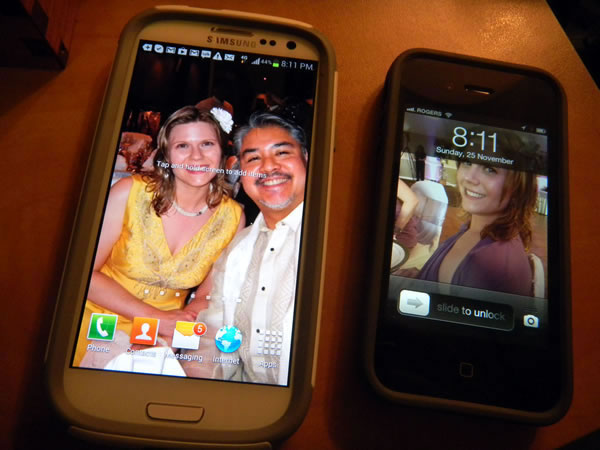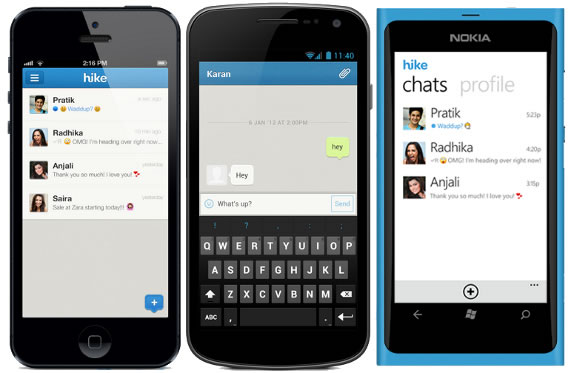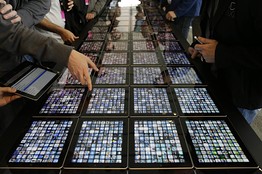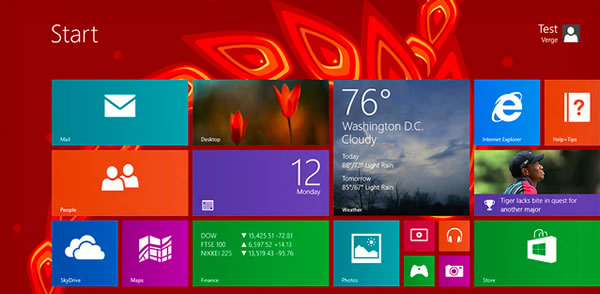“Android is Better”

My Samsung Galaxy SIII and iPhone 4S.
Android is Better is the title of Paul Stamatiou’s essay, written after what he thought would be a brief stint using an Android phone. As a UI designer at Twitter, he’d been putting together an increasing number of Android interfaces and decided that he couldn’t properly do so without truly understanding the Android “design language”. His plan was to use only a Nexus 4 for a solid week, get lots of up-close-and-personal time with Android apps, and come back to his iDevices a better Android interface designer.
He never came back. He fell in love with Android, and ended up selling his iPhone 5 and iPad Mini. From the photos in his essay, he’s still hanging onto his Mac.
Stamatiou’s essay is quite in-depth, and is a good, suitable-for-lunch long-form essay. For your benefit, here are the main points:
- Most of the services he relies on daily — email, calendar, contacts, browser, search — are Google’s, so Android’s Gmail apps and Chrome fit perfectly for his needs. He didn’t use iCloud services, so he didn’t miss them. My situation’s the same: I use GStuff for email, calendar, and contacts, not iStuff.
- Android does notifications better. While iOS’ notifications are “read-only” and simply launch the corresponding app when tapped, Android’s notifications can let you choose from a set of actions to take, you can dismiss them individually or in bulk, and they’re all collected in the “drawer”, which you open by swiping downwards from the top of the screen. Stamatiou starts the day by opening the notification drawer on his Android, and I have to admit that I check that drawer several times a day. It’s that handy.
- Freedom. If you decide that you don’t like an app within 15 minutes of buying it from Google Play, you can get a refund. Don’t like one of the default apps? Delete it (try doing that with one of Apple’s default apps for iOS). Android’s more open and flexible nature also allows developers more freedom to build the kind of apps you can’t make for iOS due to Apple’s restrictions.
- The “Back” button. A lot of power and ease-of-use, in a nice, low-cognitive-load package.
- Intents. An intent is Android developer-speak for a message from an application announcing that it performed an action or is requesting to perform an action. Another part of the same app, another app, or the OS can listen for an intent, and then act accordingly. As a result, intents allow for levels of inter-app interaction that just isn’t possible with iOS, making better workflows possible.
- Google Now. Remember all that talk about “agent” software back in the 1990s, when we ended up with Microsoft Bob? Google Now is a lot closer to that original vision.
- Android’s design philosophy. It sounds like an oxymoron if you remember the hoary old Android 2 days (or worse, the 1.6 days), but in the era of Android 4, the situation’s a good deal better. Stamatiou says that Android follows Google’s “form follows function” design philosophy. I think it follows its own “form follows function” philosophy; Google itself seems to prefer “form follows statistical analysis”.
Stamatiou’s essay will likely cause a number of back-and-forth arguments between Android and iOS fans, so if you want to know what all the fussin’ and fightin’s about, be sure to read his article.
How Much Does the Average Android, iOS, and Windows Phone App Make?

Forbes asked this question and tallied up the answers in the table below:
| Android | iOS | Windows Phone | |
|---|---|---|---|
| Number of apps per developer | 5 | 5 | 3 |
| Number of downloads per app | 60000 | 40000 | 4062 |
| Revenue per download | $0.01875 | $0.1 | $0.1538 |
| Revenue | $1125 | $4000 | $625 |
| Average revenue per developer | $6000 | $21276 | $2222 |
It would seem that:
- Android apps get the most downloads. However, Android users have become quite accustomed to free apps.
- iOS apps may not get as many downloads, but Apple users are used to paying money in exchange for nice stuff, and this behaviour seems to translate over to apps. The best odds for the big bucks come from developing iOS apps.
- Windows Phone apps may get an order of magnitude fewer downloads than Android and iOS apps, but a smaller app market makes for the best revenue per download out of all the mobile operating systems. There’s an opportunity here.
iPad-Only for a Week Experiment Ends in Frustration
Anand and Stephanie at Ink Mobility experimented with working solely with an iPad for a week. The results weren’t all that good, and they switched back to their laptops after day 4:
Click the infographic to see the source article.
I don’t think I could work solely on an iPad either. For me, it makes a great “second screen” on which to view reference material, in either PDF or browser form, or a place to offload email and social media tasks while I use my laptop for work. But not as a main “axe”.
New iPads at Apple’s September 10th Event? Bloomberg Thinks So

According to 9 to 5 Mac, Bloomberg has corroborated some reports from the rumour mill about what will be announced at Apple’s September 10th event:
- A thinner full-sized iPad
- An iPad Mini with a sharper display
- Some kind of iPhone announcement
What Windows 8.1 Will Look Like

I saw a preview version earlier today, and it appears that the Start button — one that sports just the newer Windows logo and omits the text “Start” — is coming back. It’s one of a number of changes that Windows 8.1 is introducing to make certain features a little less obscure.
BlackBerry Just Flushed

BlackBerry have announced that they’re now “exploring strategic alternatives”, which most likely means that they’re looking to get bought or hitched. This isn’t a promising sign.
I’ll quote John Gruber: “This is the part of the toilet flush where the bowl’s not quite empty, but what’s left is swirling around real fast,” and follow up with one of my own: There are going to be a lot of skid marks left in the process.


2 replies on “Mobile Tech News Roundup: “Android is Better”, How Much the Average App Makes, Working Only on a iPad, Apple’s September 10th Event, Windows 8.1 and BlackBerry’s Flush”
Free Android apps != no revenues (ads, in-app billing…)
I suppose android is OK if you use a lot of google services, but seeing as the only google service I used on a regular basis, they shut down (Reader), I’m not sure how “Android is better” for me.